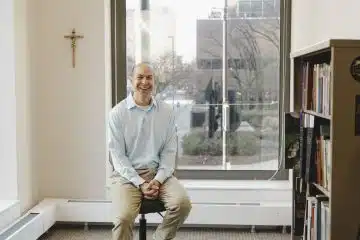Where Does the Catholic Voter Turn When Neither Major Party Respects Life?

While respect for human life must not be limited to a single issue (about which I say more below), the United States Conference of Catholic Bishops (USCCB) reminds us in “Forming Consciences for Faithful Citizenship” that abortion is the foremost consideration. Throughout the 2020 presidential election, it was easy for Catholic voters to identify which of the two major political parties was committed to protecting unborn human life and which was committed to its destruction. In 2024, that is no longer the case. Neither party is committed in principle to the notion that unborn human life should be accorded respect and, therefore, protection from elective abortion.
It goes without saying that the Democratic Party is fundamentally devoted to abortion. Massachusetts senator Elizabeth Warren recently asserted that Kamala Harris’ greatest achievement is to be the first American Vice President to visit an abortion clinic. Harris was accompanied on that visit to a Minneapolis abortion clinic by her running mate in this election, Tim Walz. As Minnesota governor, Walz signed a bill that permits health care workers to allow a child to die of exposure or starvation after a botched abortion. Vermont Senator Bernie Sanders recently stated that to be a Democrat is necessarily to be pro-abortion. The well-publicized Planned Parenthood bus providing abortions at the Democratic National Convention in August is thus the perfect symbol of the Democratic Party, which wants to be known as the abortion party.
But while the Republican Party is certainly not fanatically pro-abortion, neither is it pro-life or anti-abortion as a national policy. Donald Trump, for example, has endorsed the chemical abortion drug, Mifepristone, which is the cause of more than half of all abortions in the United States. And while J.D. Vance has stated that he is pro-life, he has endorsed in vitro fertilization, which always involves the destruction of human embryos.
The 2024 Republican Party Platform reflects this retreat from the protection of unborn life. The 2016 Republican Party Platform (adopted for the 2020 election) advocated a constitutional amendment to protect human life. “We support a human life amendment to the Constitution and legislation to make clear that the 14th Amendment’s protections apply to children before birth,” declared the prior platform.
The 2024 party platform, however, abandons that plank, no longer advocating for federal protection of unborn life, kicking the issue to the States. In doing so, the Republicans turn the 14th Amendment on its head. The 2024 platform implies that the 14th Amendment leaves States “free to pass laws” protecting unborn life but does not compel them to do so. This is exactly opposite of what the 14th Amendment provides. Passed in the wake of the Civil War, this amendment gives power to the federal government to prevent States from passing laws that do not equally protect all persons. In its fundamental misreading of the 14th Amendment, the Republican Party has discarded abortion as a federal policy issue.
Abortion is not the only measure of respect for life. Respecting life also has implications for gun control policies, penal reform, immigration policy, environmental concerns, health care issues, pregnancy and early childhood care, family leave, and capital punishment, among other matters. Respect for life necessarily involves consideration of these and other problems. We must not reduce respecting life to abortion, with indifference to these other policy concerns.
But, while undeniably important, the U.S. bishops consider these other issues secondary to abortion for two reasons. First, in addition to the matter of the taking of innocent human life, abortion is a proxy for how a person welcomes and nurtures human life more generally. Second, these other life issues—while very important—are open to good-faith policy debates, and prudential judgments about laws and regulations that are actually consistent with respect for life. This is why the United States Conference of Catholic Bishops, in its guidance through “Forming Consciences for Faithful Citizenship,” has repeatedly taught that “the threat of abortion remains our pre-eminent priority because it directly attacks our most vulnerable and voiceless brothers and sisters.” If we do not begin with respecting and protecting the lives of the most vulnerable, how can we consistently respect any human lives at any stage and in any condition?
We Catholics cannot be single-issue voters. Ignoring life issues other than abortion is an abdication of our responsibility to respect and protect all human life. We must be as serious about other life matters as we are about abortion, even when those matters permit good-faith disagreement about practical policies. But even those who have limited their consideration of political candidates based on their (or their party’s) position on abortion no longer have a place to rest their heads. Whether from fanatic devotion or negligent indifference to abortion, neither major national party is committed to protecting unborn life.
Every Catholic voter is alone with his or her hopefully well- informed conscience in the voting booth. And I would not presume to suggest that you should reach the same conclusion that I have reached. That conclusion–at the risk of making many people angry–is that this election, more than any in my lifetime, is one in which we must resist unquestioning commitment to one or the other of the major parties. We are Catholics first. And as Catholic theology defines it, neither major party, nor their respective candidates, evince respect for life.
 Dr. Kenneth Craycraft holds the James J. Gardner Chair of Moral Theology at Mount St. Mary’s Seminary & School of Theology. He is the author of Citizens Yet Strangers: Living Authentically Catholic in a Divided America (OSV 2024).
Dr. Kenneth Craycraft holds the James J. Gardner Chair of Moral Theology at Mount St. Mary’s Seminary & School of Theology. He is the author of Citizens Yet Strangers: Living Authentically Catholic in a Divided America (OSV 2024).
This article appeared in the October 2024 edition of The Catholic Telegraph Magazine. For your complimentary subscription, click here.













